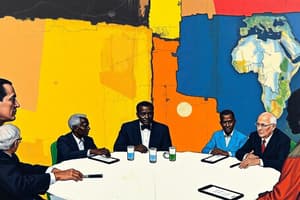Podcast
Questions and Answers
Which of the following scenarios best exemplifies the political motivations behind 19th-century imperialism?
Which of the following scenarios best exemplifies the political motivations behind 19th-century imperialism?
- A European company establishes a large rubber plantation in the Congo to supply its tire factories.
- European missionaries introduce Western education and religious practices to a remote African village.
- A European power annexes a Pacific island to use as a coaling station and naval base. (correct)
- A European nation lowers tariffs on goods imported from its colonies to stimulate trade.
How did the Industrial Revolution most directly contribute to European imperialism?
How did the Industrial Revolution most directly contribute to European imperialism?
- By creating a demand for raw materials and new markets, leading to the exploitation of overseas territories. (correct)
- By decreasing the importance of colonies as sources of agricultural products.
- By promoting democratic ideals that inspired anti-colonial movements.
- By encouraging isolationist policies among European nations.
Which of the following best illustrates the long-term cultural effects of imperialism?
Which of the following best illustrates the long-term cultural effects of imperialism?
- The rise of independence movements advocating for self-governance.
- The introduction of Western education systems and languages in colonized regions. (correct)
- The establishment of trade agreements that favored European powers.
- The extraction of natural resources to fuel industrial economies.
What was a primary difference in the way imperialism was manifested in Africa compared to Asia during the 19th century?
What was a primary difference in the way imperialism was manifested in Africa compared to Asia during the 19th century?
Which event best exemplifies the competition among European powers during the Scramble for Africa?
Which event best exemplifies the competition among European powers during the Scramble for Africa?
Following the Sepoy Rebellion of 1857, what significant change occurred in the governance of India?
Following the Sepoy Rebellion of 1857, what significant change occurred in the governance of India?
How did the Opium Wars impact China?
How did the Opium Wars impact China?
Which of the following is an example of economic exploitation during the age of imperialism?
Which of the following is an example of economic exploitation during the age of imperialism?
How did the Berlin Conference (1884-85) directly contribute to the political landscape of Africa?
How did the Berlin Conference (1884-85) directly contribute to the political landscape of Africa?
Which ideological justification was most frequently used to defend European imperialism during the late 19th century?
Which ideological justification was most frequently used to defend European imperialism during the late 19th century?
What was a significant long-term political consequence of the artificial borders drawn during the Scramble for Africa?
What was a significant long-term political consequence of the artificial borders drawn during the Scramble for Africa?
How did British colonial policies in India contribute to widespread famines during the colonial period?
How did British colonial policies in India contribute to widespread famines during the colonial period?
Which of the following best describes the role of colonies in the economic system of imperial powers during the late 19th and early 20th centuries?
Which of the following best describes the role of colonies in the economic system of imperial powers during the late 19th and early 20th centuries?
What was the primary goal of Christian missionaries in Africa during the Age of Imperialism?
What was the primary goal of Christian missionaries in Africa during the Age of Imperialism?
How did the Sepoy Rebellion (1857) in India and the Boxer Rebellion (1899-1901) in China reflect similar anti-colonial sentiments?
How did the Sepoy Rebellion (1857) in India and the Boxer Rebellion (1899-1901) in China reflect similar anti-colonial sentiments?
How did the construction of infrastructure, such as railroads and telegraphs, by European powers in their colonies primarily serve the interests of the colonizers?
How did the construction of infrastructure, such as railroads and telegraphs, by European powers in their colonies primarily serve the interests of the colonizers?
Flashcards
Economic Imperialism
Economic Imperialism
Demand for resources and new markets driven by the Industrial Revolution.
Political Imperialism
Political Imperialism
Competition among nations for power, prestige and global dominance through colonies.
Social Imperialism
Social Imperialism
Beliefs that justified European dominance; includes the idea of spreading Christianity and Western ideals.
Berlin Conference (1884-85)
Berlin Conference (1884-85)
Signup and view all the flashcards
Anti-Colonial Movements
Anti-Colonial Movements
Signup and view all the flashcards
British Raj
British Raj
Signup and view all the flashcards
Opium Wars
Opium Wars
Signup and view all the flashcards
Meiji Restoration
Meiji Restoration
Signup and view all the flashcards
Social Darwinism
Social Darwinism
Signup and view all the flashcards
Congo Free State
Congo Free State
Signup and view all the flashcards
Sepoy Rebellion (1857)
Sepoy Rebellion (1857)
Signup and view all the flashcards
Westernization
Westernization
Signup and view all the flashcards
Economic significance of colonies
Economic significance of colonies
Signup and view all the flashcards
Study Notes
- Imperialism occurred due to economic, political, and social factors
Causes of Imperialism
- The Industrial Revolution created a demand for raw materials and new markets
- Competition for global dominance fueled imperialism, especially among Britain, France, Germany, and later Japan
- Colonies were viewed as symbols of power and nationalistic pride
- The "White Man's Burden" and Social Darwinism were used to justify European dominance
- A desire to spread Christianity and Western ideals motivated imperialists
Effects of Imperialism
- The Berlin Conference (1884–85) and colonization efforts led to the partitioning of Africa and Asia (British India, French Indochina)
- Colonies experienced exploitation through forced labor and resource extraction
- Anti-colonial movements emerged (Indian National Congress, African independence movements)
- Imperialism led to global inequality, with wealth concentrated in imperial powers
- Western education systems, languages, and religions were introduced, causing cultural changes
Relative Significance
- Africa experienced more resource extraction and direct control
- Imperialism in Asia focused on trade, exemplified by the Opium Wars in China
Causation and Continuities
- Industrialization led to imperialism, which in turn led to anti-colonialism
- Exploitation of labor and resources persisted from the early 19th century through decolonization in the mid-20th century
Key Examples
- The Scramble for Africa included the Berlin Conference and the Congo Free State under Belgian King Leopold II
- In India, the British East India Company's control led to the Sepoy Rebellion (1857) and direct British Crown control
- In China, the Opium Wars resulted in the Treaty of Nanking (1842) and spheres of influence
- Japan's Meiji Restoration led to imperial expansion into Korea and Taiwan
Economic Causes Evidence
- European nations required raw materials like rubber from the Congo, cotton from India and Egypt, and oil from the Middle East
- British control of India’s textile industry and forced growth of cash crops like tea, opium, and coffee exemplify economic exploitation
- The opium trade in China led to British dominance following the Treaty of Nanking (1842)
Political Causes Evidence
- The Berlin Conference (1884–85) divided Africa among European nations to prevent conflicts, with Britain gaining South Africa and France acquiring West Africa
- The unification of Germany and Italy (1870s) spurred these countries to seek colonies for global prestige
- The "Scramble for Africa" intensified due to rivalries between Britain, France, and Germany
Ideological Causes Evidence
- Social Darwinism, which advocated for belief in racial superiority, justified imperialism
- Christian missionaries spread education and religion, exemplified by David Livingstone in Africa
Effects Evidence
- King Leopold II's Congo Free State was marked by brutal exploitation of rubber and ivory, resulting in millions of deaths due to forced labor
- Famines in British India occurred because British policies prioritized export crops over food production
- In India, direct control was exerted through the British Raj following the Sepoy Rebellion in 1857
- The artificial borders created at the Berlin Conference caused long-term ethnic conflicts, such as the Rwandan genocide
- The Indian Sepoy Rebellion (1857) was sparked by cultural insensitivity and economic grievances and marked early anti-colonial resistance
- Shaka Zulu resisted British and Boer encroachment in South Africa during the early 19th century
- The Boxer Rebellion in China (1899–1901) resisted foreign domination and missionary presence
- The introduction of English education systems, infrastructure (railroads, telegraphs), and legal systems in colonies (e.g., British India) led to Westernization
- Christianity spread across Africa, often displacing indigenous religions
Relative Significance Evidence
- Colonies were essential to industrial economies, with Britain relying on India for textiles and tea
- Trade networks expanded, with the Opium Wars opening China to British trade through "unequal treaties"
- Imperialism fueled nationalism, leading to arms races and tensions, such as the German-British naval rivalry
- Colonies, such as the Suez Canal which gave Britain access to India, became critical for global influence
- Western ideals inspired anti-colonial leaders like Mahatma Gandhi
- Indigenous cultures were suppressed, leading to language loss in Africa due to European schooling
Studying That Suits You
Use AI to generate personalized quizzes and flashcards to suit your learning preferences.




